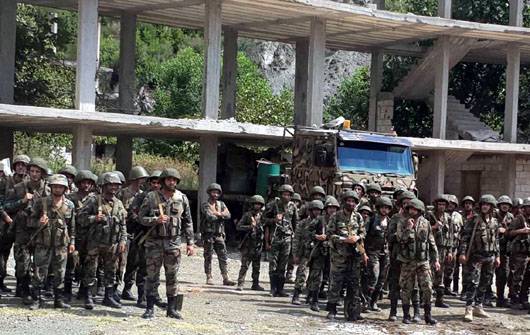Special to WorldTribune.com
UNITED NATIONS — After seven years of bitter fighting, twelve million civilians displaced,
and more than a half million people killed, Syria’s relentless civil war may be coming to a dramatic conclusion.
The final showdown seems set for the north-western province of Idlib, a rebel stronghold, where three million civilians are dangerously mixed and stranded among thirty thousand terrorists.

But the cold steel vice of Bashar Assad’s army is closing, massively supported by Russia and the Islamic Republic of Iran.
As the United Nations Security Council was making yet another vainglorious bid to stop the fighting in Idlib, half a world away in Teheran, the leaders of Russia, Turkey and the Islamic Republic of Iran were setting final plans for Idlib’s fate. The Turks were pushing for a truce; after all, the ill-fated province borders Turkey and will likely trigger a tsunami of new refugees. But Vladimir Putin and Iran’s Hassan Rouhani were preparing their forces for a final military offensive alongside Assad’s reinvigorated military.
The UN’s special envoy for Syria Staffan de Mistura warned that without a political solution in Syria, “we will see this war reach new levels of horrors.” Yet the elusive political solution which has confounded the Syrian factions and confronted a deadlocked Security Council appears stillborn.
As Nikki Haley, U.S. UN Ambassador told the Council, “An offensive in Idlib will only leave Syria weaker and more broken and create generations of Syrians who will never forget the heinous and senseless brutality of the Assad regime and its allies.”
Earlier President Donald Trump warned, “President Bashar al-Assad of Syria must not recklessly attack Idlib Province. The Russians and Iranians would be making a grave humanitarian mistake to take part in this potential human tragedy.”
Nonetheless with the nearing rumble of Assad’s artillery and punishing Russian airstrikes the noose on Idlib province may be tightening. Sadly about half of Idlib’s population has already been displaced from elsewhere in Syria, as part of agreed to “de-escalation zones.” The UN says up to 800,000 civilians, many of them children, could flee the enclave.
Though Erdogan’s political authoritarianism remains deeply unsettling, to be fair, Turkey already hosts three million Syrians and rightly fears another refugee surge. President Recep Tayyip Erdogan twice called for a ceasefire and said of the terrorists, “Let them drop their weapons so that peace would come. We need a method to deal with terrorists. This requires time and patience.”
The UN’s de Mistura warned, “Though most of besieged Idlib’s three million people were trapped civilians, terrorist organizations, foreign fighters and armed opposition groups have also gathered in the region.”
The UN envoy warned Idlib has “all the ingredients for a perfect storm.” Before the renewed fighting, two million civilians living in Idlib are in need of humanitarian assistance according to UN relief sources.
As this column has regularly and almost singularly warned over the years, Syria has become the contemporary Spanish Civil war of the 1930’s, an internationalized conflict serving as a rallying point for foreign Islamic jihadi forces and a proving ground for regional and foreign militaries; Iran, Russia, Turkey.
American Ambassador Nikki Haley warned, “The United States has been very clear, with Russia and with the broader international community: we consider any assault on Idlib to be a dangerous escalation of the conflict in Syria. If Assad, Russia, and Iran continue, the consequences will be dire.”
But besides the tragic humanitarian consequences of a renewed offensive, I reiterate there’s the real risk of more refugees fleeing into neighboring Turkey and then in turn towards Western Europe as in the fateful summer of 2015 when more than a million migrants flooded into Germany and Sweden. This is the unspoken outcome; a renewed migrant surge.
Syria remains a conflict of bewildering complexity. Will Idlib become another bloody bookmark in the annals of recent humanitarian disasters such as Ghouta or Aleppo?
Looking through the wider geopolitical lens, Russia appears to have stabilized the Assad regime, an old Soviet client state since the 1960’s.
Islamic Iran has expended huge sums of blood and treasure in supporting Syria’s Shiite Muslim minority. Yet this adventure has weakened Teheran’s regime which has met with widening domestic protests. Turkey has faced the humanitarian consequence of a war next door but has equally played a dangerous and nefarious game in supporting or attacking minority Kurdish factions. American power is focused on fighting Islamic State, offering humanitarian aid, and supporting an UN political solution.
The French delegate warned, “The situation is alarming; Syria is on the edge of the abyss.”
John J. Metzler is a United Nations correspondent covering diplomatic and defense issues. He is the author of Divided Dynamism the Diplomacy of Separated Nations: Germany, Korea, China (2014). [See pre-2011 Archives]

 By
By